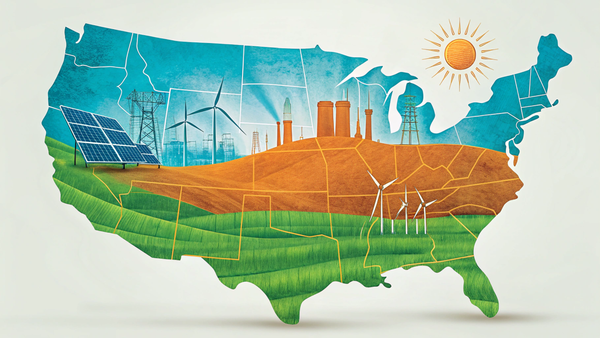News Roundup: Growing Media Impact of our OBBB Analysis
Media coverage of our OBBB analysis is accelerating—here's how Evolved and REPEAT are shaping national and regional conversations on clean energy rollback.

Following the release of Evolved Energy Research's REPEAT analysis on the implications of repealing the Inflation Reduction Act (IRA) via the One Big Beautiful Bill Act (OBBB), national and regional media outlets have begun to closely examine the wide-ranging consequences for America’s clean energy economy. This roundup synthesizes major coverage, underscoring the report’s role in shaping public discourse and helping stakeholders grasp the full scale of the rollback.
E&E News by POLITICO: "The IRA was bearing fruit. Then Trump killed it."
This article examines how the IRA had effectively spurred a "clean energy" boom in the first half of 2025, with significant surges in solar generation, battery connections, and electric vehicle sales. Evolved co-founder Ryan Jones describes therein that "I think the IRA was doing what it intended," attributing the substantial increase in solar to the law's incentives. However, the OBBB is expected to reverse these positive trends. Jones goes on to project that "Solar and wind, in particular, are hit pretty hard in the 2028-2035 time frame" due to the accelerated phase-out of tax credits under the new law.

Inside Climate News: "Cuts to Wind and Solar May Undermine GOP’s Promise of ‘Energy Dominance,’ Critics Say"
The next article further critiques the OBBB by arguing that its cuts to wind and solar fundamentally undermine the administration's stated goal of "energy dominance." Drawing on our analysis, the article highlights that any increases in oil and gas production are projected to be significantly outweighed by losses in renewable energy capacity. The REPEAT Project predicts average household energy costs will increase by over $280 per year by 2035, representing a more than 13 percent hike.

NPR / KCUR Radio: "Missouri, Kansas power prices expected to soar under Trump's new tax cut, spending law"
This report expands on the cost implications and focuses on the expected surge in power prices in Republican-led states that lack their own renewable energy policies. The piece cites the REPEAT Project to explain that removing tax incentives for wind and solar will increase their cost, leading to fewer new projects and greater reliance on more expensive natural gas plants. This shift is expected to result in significantly higher electricity rates in states like Missouri (39% increase) and Kansas (30% increase). Furthermore, the REPEAT analysis predicts that U.S. greenhouse gas emissions are expected to fall by only 25% by 2035 compared to 2005 levels under the new law, a stark contrast to the projected reduction of at least 40% under Biden-era policies.
Latitude Media: "As building new power gets harder, US utilities seek record rate increases"
This article provides real-world context to the projected cost increases, noting that U.S. utilities have already requested or secured a record-setting $29 billion in rate increases in the first half of 2025. The piece details the existing pressures on the energy sector, including an aging grid, surging demand from data centers, extreme weather, and rising wholesale market costs. The wording of the OBBB explicitly exacerbates these issues. The article references the REPEAT Project's estimates that consumer energy costs will increase by approximately $165 per household per year in 2030, and $280 by 2035, primarily due to the law's early phase-out of tech-neutral tax credits, which is expected to reduce new generation capacity by 340 gigawatts by 2035.

The Colorado Sun: "How Trump's energy agenda clashes with Colorado's green ambitions"
This article provides a specific regional lens, examining the impact of the OBBB on Colorado's ambitious clean energy goals. Despite Colorado's robust state-level initiatives, the federal changes are projected to lead to higher energy bills for households. The REPEAT Project's estimates for average U.S. household energy costs—an increase of about $165 a year in 2030 and more than $280 by 2035—are cited, translating to a 7.5% increase in 2030 and over 13% in 2035 for Colorado consumers. REPEAT co-author and Princeton Professor Jesse Jenkins is quoted on the profound impact of removing energy tax credits for utility-scale projects, which can account for 30% to 50% of project costs, effectively "raising taxes on new electricity supply by about 30% to 50%". The article also details the cessation of federal tax credits for electric vehicles (ending September 30) and home energy efficiency improvements like heat pumps and hot water heaters (ending 2026), directly affecting Colorado residents' ability to adopt clean energy technologies despite state efforts.

Reuters: “Boom Fades for U.S. Clean Energy as Trump Guts Subsidies”
This in-depth article anchors its reporting in the core findings of the REPEAT analysis, drawing a stark contrast between the growth trajectory of clean energy under the IRA and the projected reversal under the OBBB plan. Citing our quantification of future capacity losses, it outlines the expected stall in wind, solar, and battery deployment, with particular emphasis on industrial and labor market repercussions. The piece gives national visibility to our modeling of diminished investment and reduced emissions progress, framing the repeal as an abrupt course correction with global implications.
News from the States: “Illinois Bet on Solar to Meet Its Climate Goals. Trump Has the Industry in His Crosshairs”
This story brings our national modeling into sharp state-level focus once again, illustrating how Illinois' ambitious solar targets are now vulnerable. The article credits Evolved and REPEAT with showing how quickly momentum can dissipate in the absence of federal scaffolding, reinforcing the interconnectedness of national and local climate ambitions.
In addition to Evolved appearing in traditional media, our partner in this analysis, Jesse Jenkins, along with Blue Horizons executive director Jane Flegal, have made appearances on influential podcasts to continue the conversation surrounding the REPEAT Project.
The New York Times / Ezra Klein Podcast: “Is Decarbonization Dead?”
Volts Podcast by David Roberts: "Trump's big bill: How bad is it and what comes next?"

On the Volts podcast, host David Roberts framed the episode as a “wake for the Inflation Reduction Act,” examining the policy “wreckage” left in the wake of the OBBB’s passage and the political forces that enabled it. Similarly, on The Ezra Klein Show, Jenkins described how the OBBB has “gutted” the decarbonization momentum built under the IRA. Together, these discussions highlight the profound shift the OBBB marks in U.S. energy policy—and the sweeping implications it holds for the economy and the country’s climate goals.
Through these podcast appearances, our collaborative research has detailed the significant setbacks projected under the OBBB. Jenkins highlighted that while the IRA had seen solar and battery deployment "smashing new records" and good progress in electric vehicle adoption, the OBBB has effectively "wreck[ed] the solar and wind industries going forward" by accelerating the phase-out of tax credits, equating to a "raising [of] taxes 50% on wind and solar". The EV tax credits are also gone as of September 30, which is projected to reduce U.S. demand for EVs by 2030 to less than half of previous estimates. Quantitatively, the REPEAT Project's estimates presented in these discussions indicate that U.S. greenhouse gas emissions are now expected to fall by only 20-24% below 2005 levels by 2030, and potentially 28% by 2035, representing roughly half the progress projected under Biden-era policies. Furthermore, household energy costs are expected to increase by approximately $280 per year by 2035, a more than 13% hike, with potential 5% increases in gasoline prices. The discussions also emphasized how the OBBB undermines U.S. competitiveness in clean energy technologies against global rivals like China and exacerbates existing challenges like grid reliability and slow permitting processes.
Conclusion: Elevating the Conversation
The spread of our analysis across media outlets of varying geographies and audiences—from Politico & Reuters to regional posts in Kansas and Colorado—demonstrates the real impact that rigorous modeling and accessible communication can have. Our collaboration with REPEAT continues to inform national debate, support informed policymaking, and raise public awareness about the stakes of energy policy reversals.
We will continue monitoring developments and updating our modeling and briefings as the policy landscape evolves.










